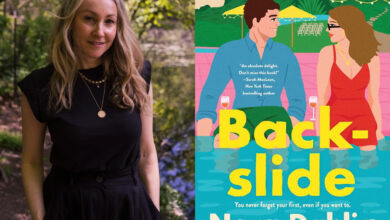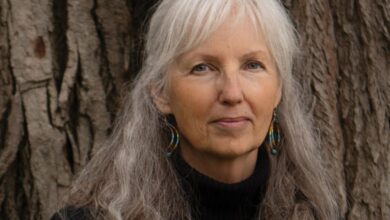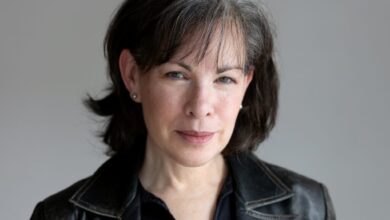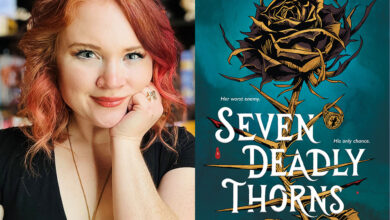Indies Introduce Q&A with Xenobe Purvis
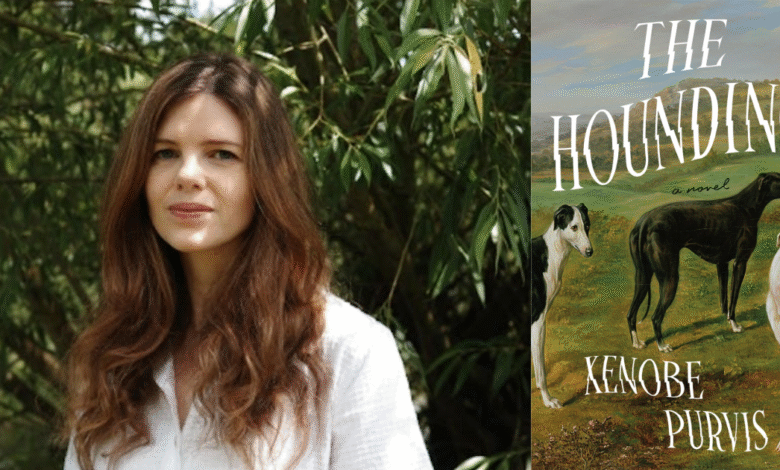
Xenobe Purvis is the author of The Hounding, a Summer/Fall 2025 Indies Introduce selection.
Marisa Spence of Ballast Book Company in Bremerton, Washington, served on the panel that selected Purvis’ book for Indies Introduce.
“If this novel had been written a century ago, it would be a classic today,” said Spence. “A brilliantly written story of a claustrophobic English village in the eighteenth century, and the violence that nips at the ankles of young women when people see them as ‘other.’ ”
Purvis sat down with Spence to discuss her debut title. This is a transcript of their discussion.
You can listen to the interview on the ABA podcast, BookED.
Marisa Spence: Hi, my name is Marisa. I’m a bookseller and Social Media and Marketing Coordinator at Ballast Book Company in Bremerton, Washington, and I am so lucky to be here today with Xenobe Purvis to discuss her Indies Introduce selection The Hounding.
Xenobe read English Literature at University of Oxford, has an MA in Creative Writing from Royal Holloway and was part of the London Library’s Emerging Writers Programme. She is a writer and literary researcher with essays published in the Times Literary Supplement, the London Magazine, and elsewhere. Her debut novel The Hounding publishes on August 5.
This was a book that I read really early on in the selection process, and I always knew that it would make the final list. I really adore this claustrophobic, dark, lyrical, historical story. Something that I have been telling everybody is that if The Hounding had been written 100 years ago, it would have been a classic today. I absolutely loved it.
Xenobe Purvis: Thank you so much, Marisa! This is so lovely to hear and thank you for having me, it’s wonderful to be on the podcast.
MS: Thank you for being with us. I really want to talk about what readers first see when they find your book on a shelf in the store — the cover with that amazing oil painting,
XP: Beautiful, isn’t it?
MS: Yeah, it was amazing. Then of course, the title, The Hounding. It’s such a simple title, but that single word contains multitudes. We have the literal definition of hounding, pursuing, and hunting someone, the way that the townspeople pursue and hound the Mansfield sisters. Then, we have the Mansfield sisters, who are being accused of turning into hounds. I wondered what your inspiration for the title was. Was it easy or difficult to come up with?
XP: Good question! It took a long time to alight on the title. It came long after the book was finished, actually. I liked that The Hounding invites questions of the readers — who is doing the hounding and who is being hounded? That really appealed to me. Tucked within it is a secret, secondary meaning I found in a dictionary, a very rare and old usage of hounding to mean a mythical creature, part human, part dogged. I loved that that meaning was hidden in there somewhere.
And finally, I really enjoyed the boldness of it; I think it shares with titles like “The Lottery.” Shirley Jackson was much in my mind as I was writing.
MS: I’m really glad you brought up Shirley Jackson because this novel has been compared to classics such as The Virgin Suicides and The Crucible, and it really reminded me of Shirley Jackson and her writing style, as well as an Austrian author named Marlen Haushofer who wrote The Wall and Killing Stella.
The similarities lie in the ability to vilify the mundane, and there is this incredible sense of tension that squeezes the reader as they’re going through the story. The real horror comes from the humans and the everyday decisions of these townsfolk; we’ve seen a lot of examples of this throughout history, so I was wondering if there was a real-life example that led to the inspiration for The Hounding?
XP: As you say, there are many examples of this kind of thing throughout history. I was actually inspired by a specific historical event; I came across the true story of a village in Oxfordshire in the 1700s in which a great rumor was said to be spreading that five sisters had been “seized with frequent barking in the manner of dogs.” I was obviously fascinated to imagine how the girls’ community would have responded to their case, and how this rumor spreading might easily have become dangerous and even violent.
I’m afraid, shamefully, I’m not familiar with the novels of Marlen Haushofer, but I agree with what you say about this incredibly sinister aspect of Shirley Jackson’s work, the vilification of the mundane, as you put it so beautifully. That is definitely terrain that The Hounding shares with Jackson’s stories. Like her, I’m very interested in thinking about the everyday awfulness of people, but I also wanted to try to understand even my most detestable characters. I really wanted to find a degree of sympathy for all of them in order to inhabit their thoughts and feelings.
MS: Yeah, we definitely see some detestable characters in The Hounding! You know, if anyone is going to be compared to a beast, I feel like it would be Pete Darling, the alcoholic ferryman [who] kicks everything off with his hatred of the Mansfield sisters and pretty much any woman who doesn’t serve him.
XP: “Fun” seems like the wrong word, but it was definitely a gratifying creative challenge to get inside the mind of someone like Pete Darling, whose worldview is quite far from my own. I really tried to get under his skin and believe what he believed for those pages that I was inside his mind.
MS: I can’t imagine being inside his mind, the way his thinking works and the way he justifies his actions. There’s a part where he says, essentially, God punished Eve so it’s his right [to punish women]. There’s also a moment where he reveres his mother as if she’s the only woman that actually holds any value, and seeing the way that he justifies his actions and the cruelty he inflicts on the Mansfield sisters. It was really, really interesting.
XP: I’m so interested in that kind of hypocrisy, hating women and revering your mother and drinking all day and believing yourself saintly. It’s so fascinating to me so I enjoyed it.
MS: Do you think that the environment he’s in led to his mindset? We have the riverbed drying up, which, again, is such a mundane thing. It’s such an everyday occurrence. But he has so much pressure on him as the ferryman who helps the townspeople across the river. Losing that, does that factor into his decision making?
XP: The riverbed drying up served a twofold purpose. I loved the idea and imagery of it — the revealed riverbed of husks and bones — that really spoke to me as a novelist. But it also has a technical function in that without a river, the ferryman has no work and so he spends his days getting drunk and obsessing about these five Mansfield sisters. So yes, his situation is certainly heightened, especially because he has inherited this livelihood from his father. He feels as though the river drying up is somehow his failed responsibility, and that he’s not living up to the example of his father.
MS: That does go into my next question about the central themes in The Hounding about girlhood. Something that I really took away from this novel — that I’ve been telling everybody about — is the way that the people in this novel see young women as other. They treat them so differently, especially if these young women don’t serve the purpose that they set out in their minds for them to serve. I was wondering how it felt to explore these themes of feminism and toxic masculinity during the writing process?
XP: Yes, these themes [were] constantly on my mind: the safety of girls, the policing of their bodies and behavior. These are concerns that have preoccupied me since my own girlhood. The Hounding gave me license to explore these familiar themes through different lenses. The book follows the perspectives of five characters, most of whom are boys and men, so trying to imagine myself into the minds of those characters allowed me to revisit themes of female autonomy and toxic masculinity from different angles, which was a new way of thinking for me. It was quite a rewarding [process] — challenging, but rewarding.
MS: I thought it was very interesting how we get the point of view of so many townsfolk, but we never see the point of view of the Mansfield sisters themselves. It really intensifies the ambiguity of what’s going on. Are they actually turning into dogs? Are they not? Is it a collective delusion brought on by the summer heat? Is it magical realism? You never quite know. Not giving the reader that insight into the minds of the Mansfield sisters, was that a conscious decision? And if so, what led to that?
XP: Yes, absolutely. One of the driving mysteries in the novel is the question of what is happening to the Mansfield sisters, and in order to preserve that mystery, we needed to never access their perspectives. Instead, we follow the perspectives of five external characters, each of whom only has a partial understanding of the events and whose viewpoints are often at odds with each other.
Establishing rumor spreading and misinformation as kind of central themes and looking at the way that they take hold in the village, I really wanted the narrative structure to reflect this swirling, shifting delivery of information.
MS: It is very dizzying and suffocating, [those] aspects of the writing; what is actually going on in the town, the way they speak to each other, the way they speak to themselves.
XP: I wanted the reader never to be quite sure of their footing. With each of these perspectives, we’re not entirely sure if we’re being delivered the truth. So many of the characters are very delusional, so there’s not a lot of trust we have in these narrative voices.
MS: It also makes me think about how you said this is actually based on a true piece of history, and it makes me wonder what happened to these real-life sisters who were accused of turning into dogs and how that played out in real life?
XP: I really searched and tried as hard as I could to excavate what became of those girls. As is so often the case in history, the testimony of the girls themselves is missing. Beyond the doctor’s letter, which inspired this whole thing, I found a probate record from some years later in the village in which the girls were described to be living. I can’t be sure that this family is the same family, but it describes five sisters and they are all that much older and they’re all alive. I take from that some kind of hope that the girls survived.
What I did do, actually, is I stole from that record the five Christian names of the girls, so the names of the characters in the books are taken from that record. But who knows what became of them? I hope that they would look kindly on my version of events.
MS: Do you think that by writing this book that they are living on? Their story hasn’t finished, because you are writing them into The Hounding.
XP: I think so. Who knows if they would want that or not? But I like to think that I have somehow endowed them with some sense of power or agency, which I felt was missing from the initial account of their case. In that rendering from that doctor they come across as afflicted and passive, and I wanted to suggest, at least, that they might have had their own motivations, their own reasons, or their own power.
MS: Your writing really makes them more human, even if we never see their point of view. It really serves as a reminder that the sisters in your book, and the real-life girls that they are based on, are just girls and they are trying to live their lives and do the best that they can in a cruel world that is inflicting so much of that patriarchy on them.
XP: Despite the fact that we never access their point of view, I did try to offer tiny glimpses of them in their home environment. Two of the perspectives we follow are the grandfather and the farm hand called Thomas, who’s desperately in love with one of the sisters. They have a softer view of the girls, and we see the girls at home bickering, as sisters sometimes do, and playing and being wonderful and inventive. I hope that in those little glimpses we get a feeling of their lives and personalities.
MS: Yeah, I totally agree. We even get a little bit of their opinion of the world that they’re in. There’s a part where one of the younger sisters says something along the lines of wanting to be a pebble, because “pebbles look very peaceful and are unencumbered by ugly things like blood and breasts.” As she’s starting to become a woman, she’s like, “I don’t want this, because this is not a world to be a woman in. This is not a town to be a woman in.” That really struck home for me, I just found it very powerful.
XP: Yes, the girls are constantly contending with the limitations that their patriarchal society imposes on them. That character, Hester, I so enjoyed bringing to life, because I think she is full of fire and spirit and she doesn’t want to be limited. I so appreciated that about her. I feel like she has a lot of courage that I can’t always claim to have myself. It was really exhilarating to imagine her views on things.
MS: Well, we’ve definitely talked a lot about different aspects of the novel today, but if you could describe the book in one word, what would The Hounding be?
XP: Such an agonizing question! If I really had to dig down, I would say “atmospheric.” I really love novels that create atmosphere through weather and landscape and mood, and I really hope that I’ve achieved that with The Hounding.
MS: I definitely think you did — it is very atmospheric!
XP: Oh well, I’m thrilled to hear that. Thank you!
MS: It’s so good. I love this book.
XP: So happy to hear that. Thank you so much. I so appreciate these thoughtful questions. It’s such a joy to talk about it with you.
MS: It was so amazing getting to discuss The Hounding with you today. And I literally cannot wait for it to publish on August 5 and for everybody to read it. I’m going to put it in everyone’s hands.
The Hounding by Xenobe Purvis (Henry Holt and Co., 9781250366382, Hardcover, Historical Fiction, $26.99, On Sale: 8/5/2025)
Source link

